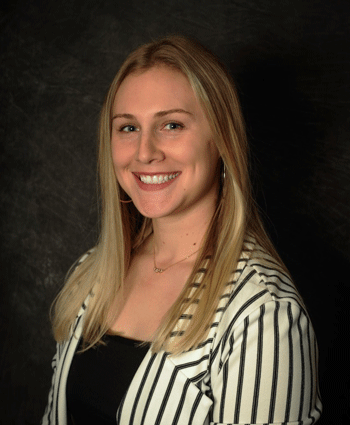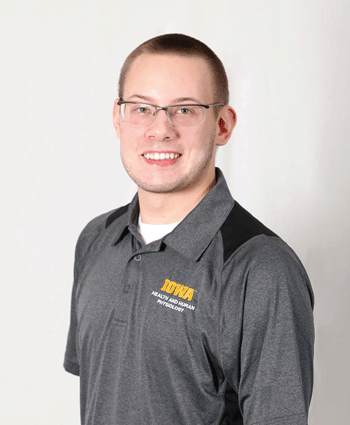In the middle of a pandemic, students in the University of Iowa’s Sport and Recreation Management Program received a once-in-a-life opportunity. As professional sports stadiums and arenas sat empty waiting for the day when fans could safely return, Associate Professor Dan Matheson converted his summer practicum with the Cedar Rapids Kernels baseball club and the Chicago Blackhawks National Hockey League franchise into a virtual learning experience.
Matheson reached out to the Kernels and the Blackhawks when COVID-19 first hit the area, expressing concern that since many internship opportunities were being canceled his students would graduate and begin their careers without first-hand experience. The two teams recognized an opportunity to help the 33 practicum students continue to progress in their professional development during a challenging time in society.

“The students worked on timely projects that addressed the Kernels operations during a time period in which the team couldn’t play baseball and had to develop revenue generating non-baseball virtual events and other digital strategies to stay relevant,” says Matheson, who’s offered this practicum with the Kernels and Blackhawks since 2014. “It was eye-opening for the students. They also worked with the Blackhawks as the organization prepared to resume play. The students got a crash course in crisis management this summer from some of the best in the business.”
As part of the practicum, each organization identifies its goals for the students in a variety of areas. The students then spend the next couple of weeks conducting research and developing recommendations in response to those organizational needs. Traditionally with the Kernels, the students (undergraduate and graduate) travel to Cedar Rapids and present their ideas to the club’s front office personnel. With the Blackhawks, the students live in Chicago for two weeks, develop their projects, and present them to the organization.
This was not a typical summer, forcing the students and their partners to pivot to this new environment.
“There was a lot of uncertainty as to how we were going to handle this adversity, but I think under the circumstances we were able to communicate in the most effective ways we could,” says master’s student and project leader Rachel Valentine. “We were able to work together and take our creativity to another level, focusing mainly on virtual events that could possibly be transformed into an in-person event eventually.”
Kernels projects
The group members pitched a series of marketing proposals to the Kernels, including establishing a podcast, having fans take batting practice at the ballpark, and creating a viewing party for Kernels and Minnesota Twins games on the big screen at Veterans Memorial Stadium. The Kernels are a minor league affiliate of the Twins.
Another idea, hosting a socially-distanced movie night at the field, was quickly implemented by the Kernels. The movie night allowed fans to stay involved in the community during the pandemic.
Jessica Fergesen, the Kernels’ senior director of corporate sales and marketing, was amazed that the students developed all these ideas while working remotely.
“For me in the world of marketing and corporate sponsorship, I’m always able to get great ideas from what they present. I always take elements of their projects and create something that will work for us,” Fergesen says. “What I enjoy each year is learning from younger kids coming out of school. For us, in baseball and sports in general, it’s important to keep your fans, but you have to grow as well. You need to be ready for the next generation all the time.”
Blackhawks projects
During a time when no fans were in the stands at the United Center, the UI students worked with the Blackhawks on how to overcome this attendance challenge to make good on its existing sponsorships.

Master’s student Steve Carlson performed an audit of the the organization’s sponsorships.
“Everything that I understand and know about the sports world suddenly just is not reality right now,” Carlson says. “There are creative social media ideas that the Blackhawks could use to benefit their sponsors or attract new sponsors by getting their fans engaged. We started at the ground floor and tried to build it up as best we could with the knowledge we had.”
Like other sports franchises, the Blackhawks have a charitable foundation. However, raising money during a pandemic can be quite challenging as charity golf tournaments and charity auctions cannot be held like in past years.
“My group was in charge of community engagement and inclusion,” Valentine says. “We were helping the Blackhawks promote diversity, equity and inclusion, focusing on virtual fundraising that the community can get involved in. During this time, it’s important to keep the fans involved and keep them excited.”
Adam Kempenaar, Blackhawks’ vice president of digital content and a UI graduate, said it would have been easy for the franchise to pass on the practicum given all the uncertainty faced by his organization during a chaotic pandemic.
“Selfishly, we are inspired by the students’ energy and ideas and didn’t want to miss out,” Kempenaar says. “In fact, that energy and those ideas were more crucial than ever, and that’s a testament to Dan Matheson’s leadership and the consistent performance he gets from his students.”
Practicum takeaways
While many sports internships were canceled or postponed in 2020, University of Iowa students were among the very few who worked directly with professional organizations. The students immersed themselves in the environment, presenting their ideas to franchise executives.
“There were elements that I didn't even know I was interested in as far as brand strategy and communication,” Valentine says. “I don’t think it only benefits us as individuals, but it also has helped organizations become stronger as well. Obviously, if they can get through a pandemic and come up with new and interesting ideas and still communicate effectively, then that is very important as well.”
All these experiences were great professional development for these graduate students, who aspire to work as a Director of Student Athlete Academic Services at a Division I institution and work in the athletics department at a United States Service Academy.
“Getting to say that we came up with ideas to help them with whatever area we were tasked with during a global pandemic is just something that hardly anybody else can boast on the resume,” Carlson says.